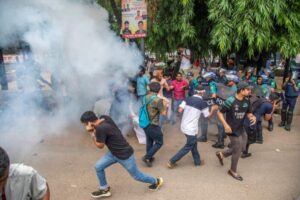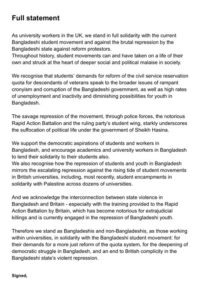
Sami @ZulkarnainSaer
‘ , , ‘, that has emerged in the wake of quota reform protests. They are also calling for an end to the Bangladeshi government’s repression of students, as well as to the British government’s training of Bangladeshi police forces like the notorious Rapid Action Battalion unit (RAB).
The statement, coordinated by the UK Bangladeshi organisation Nijjor Manush, is published amidst growing repression of faculty in Bangladesh engaging with student protestors Highlighting the progressive role of student movements historically, the statement stresses the links between recent student mass mobilisations in Bangladesh and Britain, such as the student encampment movement in solidarity with Palestinians, and the draconian response from the government and universities in both instances.
The signatories call for academics and university workers in Bangladesh to lend their solidarity to their students and affirm their support for the deepening of the democratic struggle in Bangladesh. A spokesperson from Nijjor Manush, which coordinated the statement, says: “Bangladeshis in the diaspora have been outraged by the brutal response of the Bangladeshi government to the current student movement. It has exposed the thinly-veiled contempt of the Bangladeshi government towards its people and their democratic aspirations.
On this, the Bangladeshi government can find common ground with our own government here in Britain – given the British state’s training and support for the notorious Rapid Action Battalion police unit and the recent joint agreement between the two governments to expedite the deportation of Bangladeshi asylum seekers from Britain. We call for an end to the British government’s complicity with state violence in Bangladesh and express our support for the deepening of popular democratic struggle in Bangladesh by students, workers, peasants and the oppressed as the antidote to the oppressive rule of the Awami League government”.
Dr.Adnan Fakir, lecturer at the University of Sussex says: “As Bangladeshi academics in Britain, we extend our full solidarity and support to students currently on the frontline in Bangladesh and call on our counterparts in Bangladeshi universities to support their students. The re-emergence of the quota reform movement – and the draconian response to it – has seen the arrested ambitions of students and youth in Bangladesh, facing large-scale unemployment and inequitable access to public sector employment, reveal the widespread discontent with the ruling dispensation in Bangladesh.
The government needs to publicly acknowledge, apologize, and provide justice for the martyrs of the movement in order for the nation to move forward. The collective memory of the draconian acts, without proper justice and political reformation, will only lead to repeated cycles of the horror that has transpired. The task of transforming society cannot be shouldered by students alone. It is one that can only be carried through by the students of Bangladesh alongside the peasants, the workers and the oppressed.”










